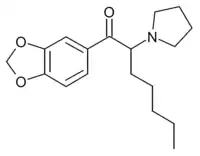MDPEP
MDPEP (also known as MD-PV8 and MDPHPP) is a substituted cathinone derivative with stimulant effects which has been sold as a designer drug. It is the longer chain heptyl homologue of the well known stimulant designer drugs MDPV and MDPHP. It was first identified in Sweden in 2019 and has been relatively widely sold, being the most commonly encountered substituted cathinone derivative found in the US in 2020–2021, though it has still not reached the same levels of use internationally as MDPV and MDPHP.[1][2][3]
 | |
| Legal status | |
|---|---|
| Legal status | |
| Identifiers | |
| |
| CAS Number |
|
| PubChem CID | |
| ChemSpider | |
| Chemical and physical data | |
| Formula | C18H25NO3 |
| Molar mass | 303.402 g·mol−1 |
| 3D model (JSmol) | |
| |
| |
References
- European Monitoring Center for Drugs and Drug Addiction (December 2020). New psychoactive substances: global markets, glocal threats and the COVID-19 pandemic. An update from the EU Early Warning System (PDF). Luxembourg: Publications Office of the European Union. doi:10.2810/921262. ISBN 9789294975584.
- Axelsson MA, Lövgren H, Kronstrand R, Green H, Bergström MA (November 2022). "Retrospective identification of new psychoactive substances in patient samples submitted for clinical drug analysis". Basic & Clinical Pharmacology & Toxicology. 131 (5): 420–434. doi:10.1111/bcpt.13786. PMID 36028947. S2CID 251865526.
- Kuropka P, Zawadzki M, Szpot P (2023). "A review of synthetic cathinones emerging in recent years (2019-2022)". Forensic Toxicology. 41 (1): 25–46. doi:10.1007/s11419-022-00639-5. PMC 9476408. PMID 36124107.
This article is issued from Wikipedia. The text is licensed under Creative Commons - Attribution - Sharealike. Additional terms may apply for the media files.